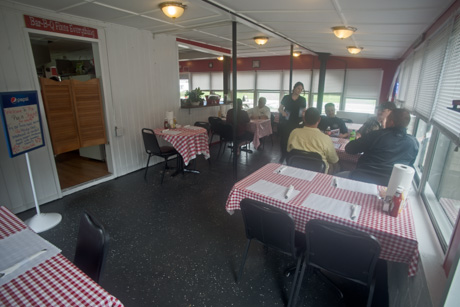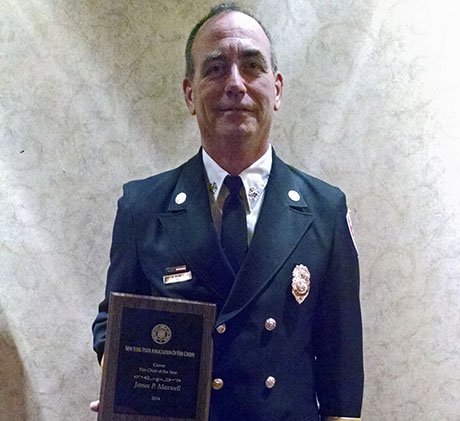The attorney for John Robinson, the Bergen man arrested 15 months after he allegedly pointed a shotgun out a window at another person, has asked Justice Donald Kunego, Town of Bergen Court, to dismiss the case "in the interest of justice."
The motion, part of several otherwise standard defense motions filed yesterday by attorney Kevin DeCarolis, addresses all seven statutory points Kunego must consider before rendering a decision.
Assistant District Attorney Kevin Finnell filed an answering affidavit, but interestingly, did not use any sort of pointed or strong language opposing the dismissal motion.
In court yesterday, DeCarolis characterized Finnell's response as favorable to his client.
"There isn't a lot there that cuts against my client and his rights in the motion," DeCarolis told Kunego. "A lot of what he raises parrots my motion, quite frankly."
Finnell hardly disagreed, stating, "I laid out the facts as I believe them to be, but I don't know what way that cuts, but certainly it is what it is."
The facts Finnell and DeCarolis seem to agree on is that Brookport resident Michael Crooks went to Robinson's house under the belief that Robinson and Mrs. Crooks had some sort of relationship that Michael Crooks found objectionable.
Crooks banged on Robinson's front door, threatened him and called him a coward for not coming out. In the process, perhaps while trying to gain entry to the house, Crooks damaged the front door.
When he couldn't get Robinson to open the door, Crooks went to the side of the house and looked in a window. At that point, he found Robinson pointing a shotgun at him.
Crooks immediately fled the residence.
On that date, Jan. 13, 2013, Crooks never filed a complaint or even contacted law enforcement. In fact, according to DeCarolis, Crooks actively tried to evade State Police during their investigation.
Crooks was later arrested and charged with criminal mischief, 4th. A charge later dismissed on the condition Crooks not be re-arrested.
Trooper Eric Daigler, who handled the investigation, consulted with other members of his department and the District Attorney's Office on whether to charge Robinson along with Crooks, and concluded that Robinson should not be arrested.
Crooks lobbied the State Police to arrest Robinson in November 2013. When that didn't work, he contacted the Sheriff's Office, which had no prior involvement with the case, in March 2014.
Robinson was arrested by a deputy in April and charged with menacing in the second degree.
"Significantly, the New York State Police, to this day, believe that Mr. Robinson should not have been charged and are not supportive of his prosecution," DeCarolis wrote in his motion.
Finnell wrote in his motion that for basic facts -- the facts contained in the DA's own files -- he agrees. He does not agree with statements by DeCarolis that go to the state of mind or thoughts of Robinson or other parties involved.
These would include the assertion by DeCarolis that Mrs. Crooks often initiated the contact with Robinson and was a "willing participant in their communication."
DeCarolis also stated that "Due to Mr. Crook's relentless and persistent actions, aggressive demeanor and verbal threats, Mr. Robinson felt threatened in his own home."
Finnell said that Robinson's actions rose to the level of probable cause for his arrest.
In addressing one of the points Kunego is asked to consider in the motion for dismissal, Finnell wrote, "The events that led to the conflict are somewhat unique and are not likely to be repeated by this defendant. The typical societal justifications for punishment, rehabilitation, retribution and deterrence are perhaps less applicable to this fact pattern. However, the defendant here might have employed other, less inherently dangerous methods in his claimed defense of his person and property, which methods would not subject him to the possibility of criminal prosecution."
One of the key factors Kunego must consider is whether dismissal would cause the public to loose confidence in the justice system.
DeCarolis argued that public sentiment is clearly behind Robinson already, citing comments left on news media accounts of Robinson's arrest (The Batavian has provided nearly exclusive coverage of Robinson's arrest).
"People expect to be able to protect their 'castle' from attack," DeCarolis wrote. "Mr. Robinson's castle was under attack by Mr. Crooks and public opinion in form of comments on the reporting of this story in the news are overwhelmingly supportive of Mr. Robinson and his actions to thwart an uninvited and threatening presence on his property."
Finnell used an analogy of about speeding tickets in his answer and concluded, "The decision of whether or not to charge in the above scenario (or dismiss in the interests of justice in this case) requires the decision maker (the court) to look beyond what is literal and do what is right. The public's confidence in the criminal justice system will be bolstered with the just decision here, no matter what that decision ultimately is."
If the case isn't dismissed, it will likely go to trial, at which point, DeCarolis is likely to raise the defense -- also a part of his dismissal motion -- that state law allows a person to defend his person and property.
"... a person may be legally justified in his actions when he acts not only to protect himself but also to prevent a criminal trespass or even prevent damage to premises," DeCarolis wrote. "In these instances the law allows for a person to go so far as to use physical force in order to defend against these various threats."
























